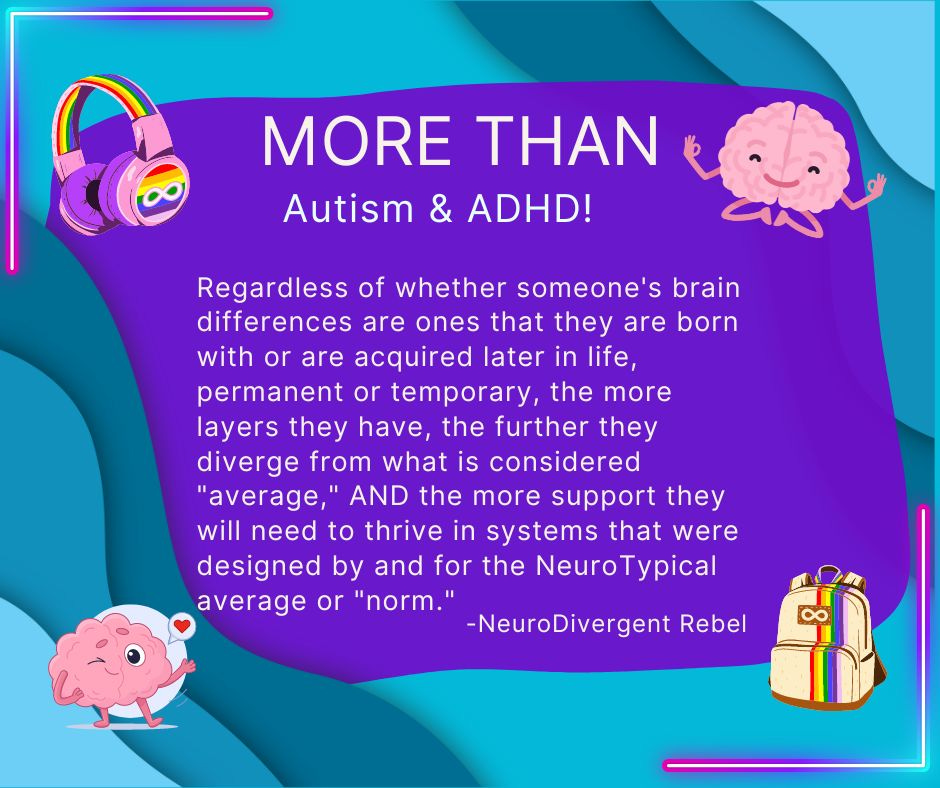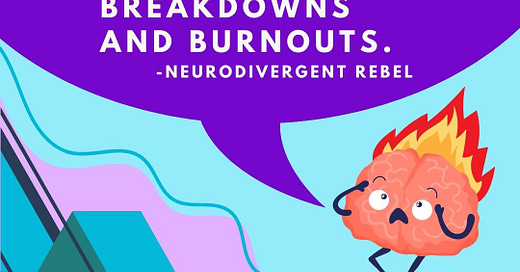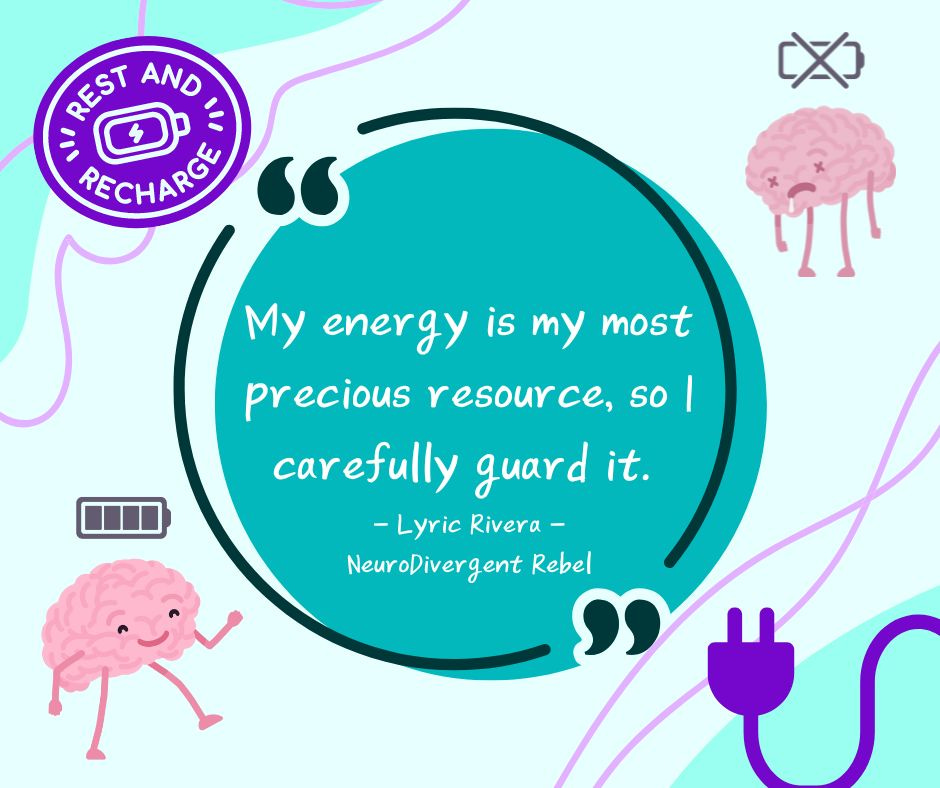NeruoDivergence, Autism, ADHD, and Finding a Career that Works for YOU
NeuroDiversity means someone else loves doing that work you hate (and is skilled in areas you aren't). Let someone else do the work you aren't good at and hate doing (when possible).
My life and the moments in it all have been influenced by my Autistic and ADHD brain.
Though my presentation and how I cope and interact with the world may change and evolve through the years, I will always be Autistic (my ADHD isn't going anywhere, either).
Not knowing this truth for the first part of my life had devastating impacts on me in that (before I knew the truth) I was constantly comparing myself to, and holding myself to, NeuroTypical standards.
Back then, before I knew the truth, I was always burning out and making myself physically & mentally ill.
When you are NeuroDivergent living in a world of NeuroTypical people (even if you don't have words or a label for what makes you different), you KNOW you are different.
When you think you are NeuroTypical but struggle with things that other NeuroTypical people find easy, those ways in which you struggle (or you feel you don't measure up) can become magnified.
All I could see were my weaknesses, and I couldn't even appreciate my strengths (until I learned I was Autistic and started to heal from that trauma, learning to love myself again).
I didn't know I was Autistic and ADHD. I thought I was a failure or a freak (as I'd often been called).
I felt myself struggling to do things other people don't struggle with, and I didn't know why "simple tasks" (I put that in air quotes because simple is relative) were so hard for me.
I was struggling. Surviving, not thriving, but I didn't know any better because just surviving was my normal.
I had no frame of reference for what thriving could look like.
Neurodiversity gave me a new way of looking at myself and my relation to the world and others in it.
Neurodiversity was first published in an academic setting by Judy Singer, an Autistic sociologist, in 1998. However, the concept of NeuroDiversity was formed by members of the Autistic Community, based on the work of Jim Sinclair and the members of Autism Network International and InLv (the Independent Living Community) in the early 1990s (However, it wasn't called NeuroDiversity... yet.)
Judy (who was a member of ANI & InLv) published her thesis on Neurodiversity based on the discussions she was part of at ANI & InLv, introducing the ideas of the Autistic Rights Movement to the world of academia, giving it credibility years later, in 1998.
Unfortunately, Judy has recently expressed (and then doubled down on) some VERY troubling views.)
Though Judy herself (like all people) is imperfect, the concept of NeuroDiversity is invaluable in discussing human brain (and neurological) diversity.
Judy may have helped publicize the name, BUT Autistic and other NeuroDivergent People all over the world have been responsible for making NeuroDiversity (and the ideas first dreamed up by the members of ANI & InLV) a movement for social justice and equity for NeuroDivergent (and all) people.
NeuroDiversity argues that diverse neurological conditions and learning disabilities (Autism, dyslexia, dyscalculia, hyperlexia, dyspraxia, ADHD, obsessive-compulsive disorder (OCD), and Tourette syndrome (ALL of which are more common in Autistic people) are the result of normal variations in human brain type or different shades of humanity, as I like to say.
NeuroDivergent people's differences are cognitive, often invisible, and impact how we interpret the world, process information, and interact with others.
In NeuroDivergent-led groups and circles, we often talk about the types of neurological/brain diversity people are born with (such as neuro-developmental differences like some of the ones I mentioned earlier). However, we MUST go deeper for true inclusion of all brain types.
Human brains are complicated and amazingly adaptive but can also be quite fragile.
The brains of people (and likely other animals as well) can be altered based on experiences that occur in our lives (such as trauma, abuse, and injuries).
People who grow up in environments where they are nurtured, experiencing minimal trauma, develop very different brains from those of us who grew up in broken homes or abusive and traumatic situations.
Even as adults, one's brain can be forever (or temporarily altered), causing one's perception of their emotions, the world around them, or communication abilities to change (PTSD, TBI, Anxiety, and Depression all are acquired conditions that can majorly alter the way a person experiences life – long or short-term).
Additionally, when someone is NeuroDivergent, they are often NeuroDivergent in multiple ways.
Many of us have layers to our NeuroDivergence (or multiple NeuroTypes).
For example, Autism and ADHD co-occur so frequently that Autistic ADHDers online have coined the term AuDHD to describe the experience of being both Autistic and ADHD at once.
Autism and ADHD are both forms of NeuroDivergence I was born with (that influence my perception of the world and communication).
I also have an anxiety disorder (that I developed from living in a world where people were cruel and unkind to me due to my undiagnosed Autism, ADHD, and Hyperlexia – the NeuroTypes I was born with).
Anxiety and trauma are conditions I have acquired since birth (that significantly influence my thoughts, actions, motivations, and life).
Regardless of whether someone's brain differences are ones that they are born with or are acquired later in life, permanent or temporary, the more layers they have, the further they diverge from what is considered "average," AND the more support they will need to thrive in systems that were designed by and for the NeuroTypical average or "norm."
I've dedicated my life to asking people to consider this human spectrum of differences.

Unfortunately, society's systems set up by the NeuroMajority (NeuroTypical people) are often harmful (because those in the majority fail to include input from members of various NeuroMinorities) when developing these systems.
Instead of included, we've been pathologized, told we were broken and asked to try harder to fit in instead of flexing the systems (so that we may find solutions that work well for everyone and may create truly inclusive systems and spaces).
I entered the workforce in my teens, first working for the family business, then moving on to working in fast food, then retail, and eventually corporate, HR, operations, and business consulting.
Most of my professional career was spent not knowing that I was NeuroDivergent because these differences in how our minds work are invisible. This meant I was not adequately accommodated in many workspaces I entered.
I've met people discovering their NeuroDivergence in their forties, fifties, sixties, seventies, and beyond.
When you are a NeuroDivergent Person living in a world of NeuroTypical people (even if you don't have words for what makes you different), you KNOW you are different.
You feel yourself struggling to do things other people don't struggle with, and you don't know why "simple tasks" (I put that in air quotes because simple is relative) are so challenging for you.
I was struggling. Surviving, not thriving (but I didn't know any better because just surviving was my normal). I had no frame of reference for what thriving could look like.
Neurodiversity gave me a new way of looking at myself and my relation to the world and other people in it.
I no longer perceive myself as a broken, NeuroTypical person. I'm simply NeuroDivergent.
Now that I know the truth, I've been working to unlearn old, unhealthy habits. I've even begun to view myself with more self-compassion and stopped looking at myself as if I am "the problem."
I've even changed how I show up in workplaces and other spaces because of this new information.
NeuroDivergent people's differences are cognitive and invisible and impact how we interpret the world, process information, and interact with others.
Our differences also impact our strengths and weaknesses, what tasks and environments will drain us, and what tasks and environments will invigorate us.
A career or skills mismatch can lead NeuroDivergent humans to breakdowns and burnouts.
Some NeuroDivergent People have a "talent" for pushing themselves past where they should push themselves.
I am one of those Autistic People who has repeatedly experienced Autistic Burnout in their lives.
These burnouts tend to be caused by stressors in an Autistic person's environment and often include sensory distress and other sensory-related triggers.
Until learning I was Autistic at 29, I had been in an endless cycle of burning myself out because I didn't understand that my pace could and should be different from the pace of people around me.
I didn't appreciate my differences, how to speak up for them, or that I might need to tweak my career path slightly to succeed.
The Goal: Finding a career that I love that also recharges and doesn't drain me is crucial for my health and success.
Now that I know I'm NeuroDivergent, I have been learning what I need, how my mind works, and ways to work with my mind instead of against it.
The goal is to build a career that utilizes our strengths and skills to find work that will energize and recharge us (instead of getting stuck in jobs that wear us down or are poorly suited to our individual needs).
Because each and every Autistic/NeuroDivergent Person is an individual, this can vary significantly from person to person.
What's right for me may not work for the next NeuroDivergent (or even Autistic) Person.
I've known for years that I need a career path that doesn't require a lot of physical activity due to chronic pain (and a bad back and knee that revealed themselves to me in high school).
Since learning I'm Autistic, I've also realized that I need to work on my own as much as possible, with minimal supervision and micromanagement (because of my sensory needs and intense reaction to surprises and demands from others).
I know that reception work, or anything with many interruptions, phone calls, or a schedule or events that are hard to predict, will leave me perpetually stressed.
I also know that when work time is over, I need to be able to REALLY UNPLUG and shut down (because my obsessive mind won't rest if I have to be “ON” all the time).
I also know that I can not be around a lot of sensory input day after day.
If forced to work in a busy, open office, my work performance will be low, my stress will be high, and my seizures (now four years seizure-free) become more likely to return.
My energy is my most precious resource, so I carefully guard it.
At this point in my life, I can handle about 2 full work days of interaction with other humans (Zoom calls, presentations, etc., NOT on a Monday or a Friday).
Then, I will need at least one quiet day for admin work for the business and two quiet work days on my own writing/creating content.
Even when tired, certain types of work and tasks invigorate me, so I am careful to balance draining and energizing tasks (cautious to do only a few draining ones in a row without more energizing tasks to balance them out).
I am firm about not working evenings and weekends (since it would be easy to overwork myself doing tasks I enjoy). I otherwise have no "off switch."
Everyone's different, but I really need the downtime and recovery time after dealing with people (even more so when I have to see people face to face). I'm limited in how much I can handle.
Learning and respecting these limits has been transformative.
I now live reminding myself of the phrase "you cannot pour from an empty cup" – a moral I wish I would have learned years ago.
Now, I am gentle with myself and set more attainable and realistic goals. I'm still learning to set reasonable objectives (now that I no longer model myself by NeuroTypical standards) - almost seven years since my Autistic Discovery.
Taking control of our lives might be the only way we can level the playing field in the NeuroTypical game, finding our own unique pace and letting go of NeuroTypical standards & expectations.
Keep reading with a 7-day free trial
Subscribe to NeuroDivergent Rebel’s Substack to keep reading this post and get 7 days of free access to the full post archives.





